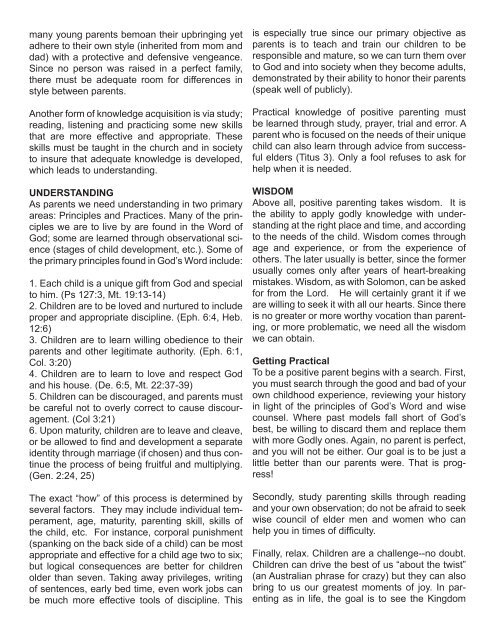On Life at Home
This issue centers around common issues that parents face at home and in their marriage. We also deal with some topics that no one thinks about, but are of incredible importance! Interviews include Neverclaim, Matt Price, Hugh Halter, and Finding Favor.
This issue centers around common issues that parents face at home and in their marriage. We also deal with some topics that no one thinks about, but are of incredible importance!
Interviews include Neverclaim, Matt Price, Hugh Halter, and Finding Favor.
You also want an ePaper? Increase the reach of your titles
YUMPU automatically turns print PDFs into web optimized ePapers that Google loves.
many young parents bemoan their upbringing yet<br />
adhere to their own style (inherited from mom and<br />
dad) with a protective and defensive vengeance.<br />
Since no person was raised in a perfect family,<br />
there must be adequ<strong>at</strong>e room for differences in<br />
style between parents.<br />
Another form of knowledge acquisition is via study;<br />
reading, listening and practicing some new skills<br />
th<strong>at</strong> are more effective and appropri<strong>at</strong>e. These<br />
skills must be taught in the church and in society<br />
to insure th<strong>at</strong> adequ<strong>at</strong>e knowledge is developed,<br />
which leads to understanding.<br />
UNDERSTANDING<br />
As parents we need understanding in two primary<br />
areas: Principles and Practices. Many of the principles<br />
we are to live by are found in the Word of<br />
God; some are learned through observ<strong>at</strong>ional science<br />
(stages of child development, etc.). Some of<br />
the primary principles found in God’s Word include:<br />
1. Each child is a unique gift from God and special<br />
to him. (Ps 127:3, Mt. 19:13-14)<br />
2. Children are to be loved and nurtured to include<br />
proper and appropri<strong>at</strong>e discipline. (Eph. 6:4, Heb.<br />
12:6)<br />
3. Children are to learn willing obedience to their<br />
parents and other legitim<strong>at</strong>e authority. (Eph. 6:1,<br />
Col. 3:20)<br />
4. Children are to learn to love and respect God<br />
and his house. (De. 6:5, Mt. 22:37-39)<br />
5. Children can be discouraged, and parents must<br />
be careful not to overly correct to cause discouragement.<br />
(Col 3:21)<br />
6. Upon m<strong>at</strong>urity, children are to leave and cleave,<br />
or be allowed to find and development a separ<strong>at</strong>e<br />
identity through marriage (if chosen) and thus continue<br />
the process of being fruitful and multiplying.<br />
(Gen. 2:24, 25)<br />
The exact “how” of this process is determined by<br />
several factors. They may include individual temperament,<br />
age, m<strong>at</strong>urity, parenting skill, skills of<br />
the child, etc. For instance, corporal punishment<br />
(spanking on the back side of a child) can be most<br />
appropri<strong>at</strong>e and effective for a child age two to six;<br />
but logical consequences are better for children<br />
older than seven. Taking away privileges, writing<br />
of sentences, early bed time, even work jobs can<br />
be much more effective tools of discipline. This<br />
is especially true since our primary objective as<br />
parents is to teach and train our children to be<br />
responsible and m<strong>at</strong>ure, so we can turn them over<br />
to God and into society when they become adults,<br />
demonstr<strong>at</strong>ed by their ability to honor their parents<br />
(speak well of publicly).<br />
Practical knowledge of positive parenting must<br />
be learned through study, prayer, trial and error. A<br />
parent who is focused on the needs of their unique<br />
child can also learn through advice from successful<br />
elders (Titus 3). <strong>On</strong>ly a fool refuses to ask for<br />
help when it is needed.<br />
WISDOM<br />
Above all, positive parenting takes wisdom. It is<br />
the ability to apply godly knowledge with understanding<br />
<strong>at</strong> the right place and time, and according<br />
to the needs of the child. Wisdom comes through<br />
age and experience, or from the experience of<br />
others. The l<strong>at</strong>er usually is better, since the former<br />
usually comes only after years of heart-breaking<br />
mistakes. Wisdom, as with Solomon, can be asked<br />
for from the Lord. He will certainly grant it if we<br />
are willing to seek it with all our hearts. Since there<br />
is no gre<strong>at</strong>er or more worthy voc<strong>at</strong>ion than parenting,<br />
or more problem<strong>at</strong>ic, we need all the wisdom<br />
we can obtain.<br />
Getting Practical<br />
To be a positive parent begins with a search. First,<br />
you must search through the good and bad of your<br />
own childhood experience, reviewing your history<br />
in light of the principles of God’s Word and wise<br />
counsel. Where past models fall short of God’s<br />
best, be willing to discard them and replace them<br />
with more Godly ones. Again, no parent is perfect,<br />
and you will not be either. Our goal is to be just a<br />
little better than our parents were. Th<strong>at</strong> is progress!<br />
Secondly, study parenting skills through reading<br />
and your own observ<strong>at</strong>ion; do not be afraid to seek<br />
wise council of elder men and women who can<br />
help you in times of difficulty.<br />
Finally, relax. Children are a challenge--no doubt.<br />
Children can drive the best of us “about the twist”<br />
(an Australian phrase for crazy) but they can also<br />
bring to us our gre<strong>at</strong>est moments of joy. In parenting<br />
as in life, the goal is to see the Kingdom

















